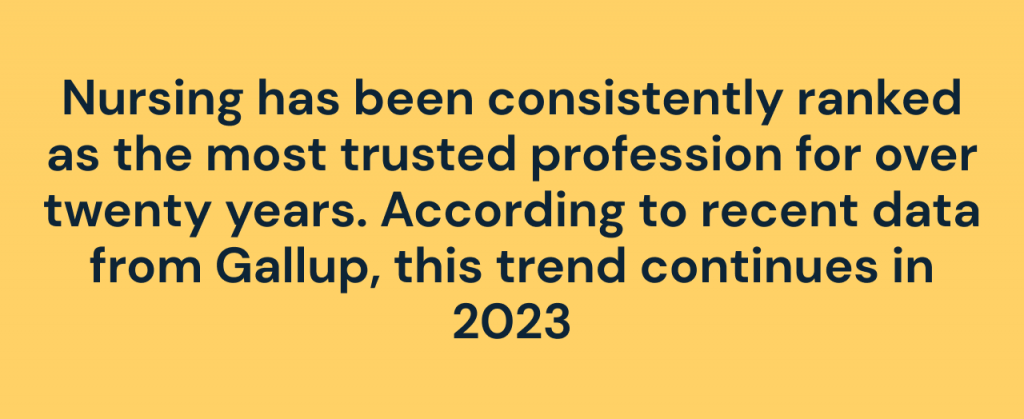If you’re an international student with dreams of pursuing a career in nursing, the United States holds a treasure trove of opportunities for you. Whether you aspire to provide direct patient care, conduct groundbreaking research, or even embark on a teaching track in nursing, we’ll walk you through the essential things you need to know to become a nurse in the United States. We will help you navigate the path toward this fulfilling and highly respected profession in the healthcare industry.

How to Get an F1 Visa: Starting Your Journey into Nursing
Before international students can launch their journey into becoming a nurse in the USA, there’s an important first step they need to take: obtaining an F1 visa. This particular visa is specifically designed for academic study. To ensure a seamless application process, it’s essential for future students, including Canadian and Mexican applicants, to know its requirements. Fear not! We’re here to guide you through the steps, making it a breeze for you.
Here’s what you should do:
- Find an SEVP-Approved School. Start by researching and applying to a school in the United States that is approved by the Student and Exchange Visitor Program (SEVP). This step is crucial as it ensures that your school meets the necessary requirements for international students.
- Register in SEVIS and pay the SEVIS I-901 Fee. Once your application is accepted, the SEVP-approved school will register you in the Student and Exchange Visitor Information System (SEVIS). You will then need to pay the SEVIS I-901 fee as part of the visa process.
- Receive the I-20 Form. After registering in SEVIS and paying the fee, the school will issue you an I-20 form. This form is essential for your visa application.
- Apply for a student visa. Using the I-20 form, you can apply for an F1 student visa at a US embassy or consulate. Present it to the consular officer during the interview and answer their questions confidently.
- Plan your traveling. Make travel arrangements, ensuring you arrive in the USA within the specified timeframe.
Important Considerations for Your F1 Visa Application
Apart from being accepted into an approved academic program, there are a few other important things to consider when applying for an F1 visa. These requirements are in place to ensure a smooth and successful experience for international students like yourself. Here’s what you need to know:
- Being a full-time student. It’s necessary to be a full-time student during your time in the USA. This means enrolling in and completing the minimum number of credit hours per semester as determined by your program.
- Test of English as a Foreign Language (TOEFL) certificate. As an international student, you’ll need to show that you have a good command of the English language. Most nursing schools require a TOEFL certificate to prove your English proficiency.
It’s important to remember that the minimum TOEFL scores can vary among nursing schools. Make sure to check with your chosen programs for their specific requirements.
- Sufficient funds for self-support. It’s important to demonstrate that you have enough money to support yourself financially while studying in the USA. This includes covering your tuition fees, living expenses, and other costs. You can show this by providing bank statements, scholarship letters, or other supporting documents.
- Maintaining a residence abroad. It’s important to show that you have a place to call home in your own country. This shows the immigration authorities that you have the intention to return to your home country after completing your studies in the USA.
According to a recent report from McKinsey, there may be a big shortage of nurses available in the coming years. The report suggests that by 2025, there could be a shortage of 450,000 nurses nationwide, which would be around 20 percent of the total needed.
Being an international student in nursing has its challenges from complex coursework to cultural and language barriers. Writing essays and academic papers can be a big challenge especially for those who are adapting to a new system. Using a nursing essay writing service can be a big help in such situations. These services can provide expert help in writing high quality essays so you can meet academic requirements while maintaining a balance study-life schedule.
By partnering with professionals who are expertise in nursing related topics, you can focus on practical training and theoretical learning without the added stress of tight deadlines. These services are very helpful for international students who want to excel academically while preparing for a rewarding career in the healthcare industry.
Employment Options for Nursing Students with F1 Visa
During and after their nursing education, international students have certain employment options that can provide valuable practical experience and financial support. These options include:
CPT (Curricular Practical Training)
- CPT is for students who are currently studying
- It is intended for a particular employer and needs to be fulfilled prior to the commencement
- Consent from the International Student Services (ISS) and support from the education department are a must
- It authorizes students to engage in internships, rotations in psychiatric care, cooperative education programs, or practical experiences aligned with their major coursework, enabling them to gain valuable, hands-on practice in the field
- CPT can be either full-time or part-time
- Part-time CPT has no set maximum duration, while full-time CPT can be pursued for up to 12 months
- Students have the opportunity to request CPT until the concluding day of their final academic quarter
OPT (Optional Practical Training)
- OPT is commonly undertaken after students have graduated
- It is not tied to a specific employer and offers students the flexibility to explore a variety of job opportunities
- A paper application to the USCIS is part of the process of becoming eligible for OPT
- Consent from the United States Citizenship and Immigration Services (USCIS) is necessary for OPT participation
- A student must receive the Employment Authorization Document (EAD) from USCIS to be eligible for OPT
- The program does not require earning course credits
- Typically, it takes around 3 to 5 months for OPT applications to be processed
- A student can apply for OPT as early as 90 days before the last day of their final quarter and up to 60 days after
- The OPT must not exceed 12 months
- It can be prolonged to 24 months for STEM graduates who are eligible
Being an international student pursuing a nursing career in the US is exciting and tough. While you focus on academics and visas, don’t forget about coursework and writing assignments which are part of nursing education. For students who are overwhelmed, seeking essay writing help can be a lifesaver. Professional help means your academic papers are well written, researched and meet all requirements so you can focus on clinicals and other important parts of your studies.
With the help of expert writers, students can manage their time better and keep their grades high. This is especially helpful when you have to juggle clinicals, part time work and other responsibilities that come with studying abroad. Use these resources and make your journey to become a nurse in the US more achievable.
STEM OPT extension
Upon completion of a STEM (Science, Technology, Engineering, or Mathematics) degree, students may qualify for an additional 24 months of OPT, which grants them the opportunity to work in the United States while they search for employment or pursue further educational opportunities. This extension enables STEM graduates to continue building their careers and contributing to their chosen fields.
Furthermore, international nursing students have the option to seek employment opportunities after completion of their studies, including the H1B visa or EB3 (Green Card Visa), which offer pathways for working as registered nurses in the USA. These visa options are not limited to general nursing but also extend to specialized fields such as psychiatric nursing, enabling nurses with expertise in mental health to pursue fulfilling careers in the United States — or even shift their focus to healthcare policy or economic impact through related essay topics on microeconomics.
Understanding the H1B Visa and EB3 (Green Card Visa)
The above-mentioned visa categories provide pathways for foreign nationals to work and live in the country permanently. Let’s explore these two options in more detail.
H1B Visa
The H1B visa is a type of visa that enables U.S. employers to hire foreign workers in specialized fields. As a nurse, you might qualify for an H1B visa if you have specialized skills, knowledge, or experience that are considered vital for the job. Typically, the H1B visa requires sponsorship from an employer in the United States. It means that you need a job offer from a U.S. employer to apply. This visa is valid for a specific duration, usually up to three years, and can be extended for a maximum of six years.
EB3 (Green Card Visa)
The EB3 visa, also referred to as the employment-based third preference visa, is a category of immigrant visa that leads to obtaining permanent residency (Green Card) in the United States. It is specifically intended for skilled workers, professionals, and other individuals, including nurses. To be eligible for the EB3 visa, you must have a job offer from a U.S. employer who is willing to support your application. The application process involves various stages, including labor certification and submitting a petition to the U.S. Citizenship and Immigration Services (USCIS). It is important to be aware that the number of available EB3 visas is limited each year, and there may be a waiting period due to visa backlogs.
It’s important to note that the H1B visa and EB3 visa have different requirements, processes, and implications. Consulting with an immigration attorney or seeking guidance from your employer can provide you with more specific information and assistance in determining the best option for your situation.
Remember, navigating the visa process can be complex, so it’s crucial to stay informed, seek professional guidance, and ensure compliance with all immigration regulations.
Recommended reads





